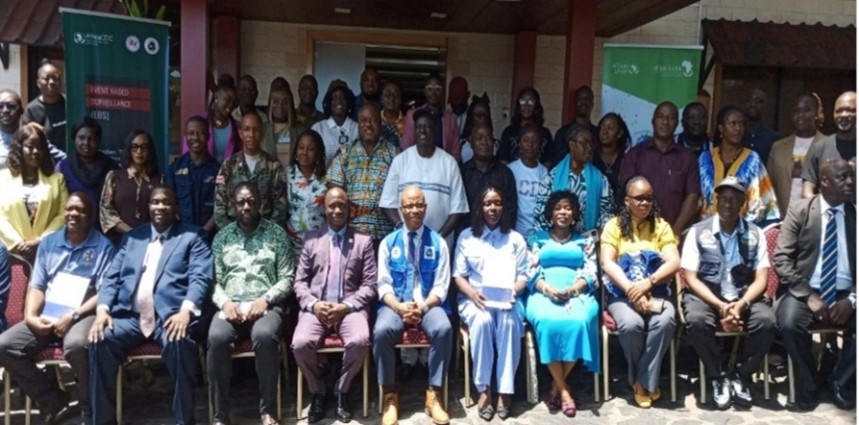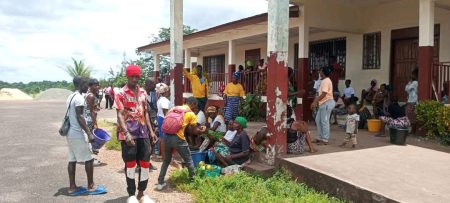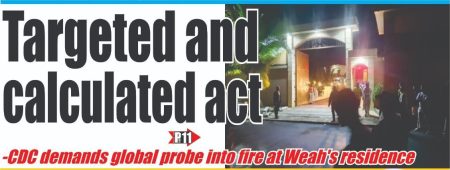The National Public Health Institute of Liberia (NPHIL), in collaboration with the African Center for Disease Control (Africa CDC), launched comprehensive event-based surveillance technical guidelines in Monrovia, Liberia on April 7, 2025. This collaborative effort signifies a significant stride towards strengthening Liberia’s public health emergency preparedness and response capabilities, particularly in the context of disease outbreaks. The guidelines are designed to provide a standardized framework for detecting, investigating, and responding to public health events, ultimately aiming to minimize the spread of diseases and reduce casualties during outbreaks. The launch event brought together key stakeholders from various government ministries and agencies, international partners, and the One Health Public Platform, underscoring the collaborative nature of this initiative.
Dr. Dougbe Chris Nyan, Director General of NPHIL, emphasized the importance of utilizing these guidelines to effectively combat epidemics. He highlighted the scope of the guidelines, which encompass not only prevalent diseases like Ebola and Monkeypox but also those commonly found in tropical regions of Africa. Dr. Nyan expressed gratitude to the multi-sectoral surveillance technical committee, comprising representatives from various ministries, agencies, and international partners, who played a pivotal role in developing these guidelines. Their expertise and collaborative efforts ensured the guidelines are comprehensive and tailored to Liberia’s specific needs and context.
Dr. Catherine Cooper, Liberia’s Chief Medical Officer and Deputy Minister of Health, represented Health Minister Dr. Louise Kpoto at the launch. She commended the progress Liberia has made in enhancing its preparedness for outbreaks, attributing it to robust partnerships and the incorporation of diverse stakeholders like the One Health Public Platform. This integrated approach acknowledges the interconnectedness of human, animal, and environmental health in preventing and controlling diseases. Dr. Cooper emphasized the strides Liberia has made in strengthening its data systems and building human resource capacity, critical components of an effective surveillance and response system. She expressed confidence in Liberia’s trajectory towards becoming a center of excellence in disease surveillance and response, fueled by significant investments from the government and partners in strengthening surveillance systems.
Dr. Alinon Kokou, Regional Director for West Africa at the Africa CDC, echoed the importance of collaboration between the Ministry of Health and NPHIL in combating disease outbreaks. He underscored Liberia’s potential to become a regional leader in outbreak control and response, citing the country’s demonstrated performance in managing previous outbreaks. This recognition highlights the significant progress Liberia has made in building its public health infrastructure and capacity. The Africa CDC’s support and partnership are crucial in fostering regional collaboration and sharing best practices for disease surveillance and control.
Representatives from other key agencies also pledged their commitment to supporting this initiative. Dr. Emmanuel Yarkpawolo, Acting Executive Director of the Environmental Protection Agency, and Ansu Dorley, Executive Director of the National Disaster Management Agency, both affirmed their agencies’ willingness to collaborate with NPHIL and the Ministry of Health. Their participation highlights the importance of a multi-sectoral approach to public health emergencies, recognizing the interconnectedness of environmental factors and disaster management with disease outbreaks. The inclusive nature of the launch event, which involved participants from the Ministry of National Defense, the Liberia National Police, and other organizations, demonstrates the whole-of-government approach adopted by Liberia in addressing public health challenges.
The launch of these event-based surveillance technical guidelines marks a significant milestone in Liberia’s ongoing efforts to strengthen its public health security. The guidelines provide a much-needed framework for a coordinated and effective response to disease outbreaks, drawing upon the expertise and resources of various government agencies, international partners, and the One Health Public Platform. The collaborative approach adopted by Liberia, combined with investments in data systems and human resource capacity, positions the country as a potential leader in disease surveillance and response in the region. The commitment expressed by various stakeholders to work together towards a common goal of protecting public health underscores the significance of this initiative in safeguarding the health and well-being of Liberians. The comprehensive nature of the guidelines, covering both known and emerging diseases, reflects a proactive approach to disease surveillance and control, essential for mitigating the impact of future outbreaks. This proactive stance, combined with a robust surveillance system and collaborative partnerships, will be instrumental in protecting Liberia from public health threats and ensuring a healthier future for its citizens.














